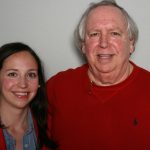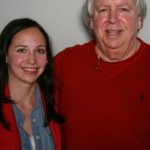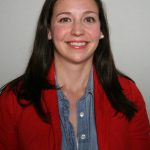Pablo Diaz-Esquivel and Elizabeth Diaz-Esquivel
Description
Elizabeth Diaz-Esquivel (26) interviews her father Pablo Diaz-Esquivel (68) about his youth growing up in pre-Castro Cuba, his involvement as a 15 year old in the rebel movement helping prepare for the Bay of Pigs invasion in 1961, escaping Havana to a convent in the south of Cuba, leaving Cuba on a Spanish passport shortly thereafter to Spain, and ultimately arriving in New Jersey in 1965. He is drafted in the U.S Army for 2 years and then moves to Amarillo, TX to be near his brother, finish school, attend college, and medical school.Subject Log / Time Code
Participants
- Pablo Diaz-Esquivel
- Elizabeth Diaz-Esquivel
Recording Locations
Atlanta Story BoothVenue / Recording Kit
Initiatives
Keywords
Subjects
People
Places
Transcript
StoryCorps uses Google Cloud Speech-to-Text and Natural Language API to provide machine-generated transcripts. Transcripts have not been checked for accuracy and may contain errors. Learn more about our FAQs through our Help Center or do not hesitate to get in touch with us if you have any questions.
00:06 Hi, my name is Elizabeth diaz-esquivel. I'm 26 years old. Today is March 29th, 2014. I'm at the Atlanta History Center, and I'm about to interview my dad Pablo diaz-esquivel.
00:20 My name is Pablo Rafael diaz-esquivel. I'm 68 years old today stays March 29th, 2014, the Atlanta Historical Center.
00:34 I want to talk to my daughter Elizabeth.
00:39 So I brought you here. Because you're such an inspiration to me and everything about your life. And I think that
00:50 Everyone should hear your story because it's so interesting and I think that
00:59 It just
01:01 So unique and that you come such a long way and had so many different experiences in your life that I enjoy talking to you so much. You're my favorite dinner date. So I think but I hope people will really enjoy this. So, I guess I want to start with where were you born?
01:20 I was born in the city of South y La Grande, which is a city in the middle of the north part of Cuba. Very close in the river is a river called sagua La Grande around that time. There were approximately thirty-five factories making sugar cane
01:41 Cuba was a big producers of sugar and the United States basically bought all the sugar that the Cuda Cuban production at the time and that's one of the things that prompted Castro to Caribbean at American because he felt that we were controlled by the quote Gringos Americans all the time growing up in Cuba. I had a wonderful childhood the town looking back at it very sophisticated lots of Education people. Let's play sports middle class and I do not know that I belong to the upper class. I thought that I was just like everybody else but
02:29 Not too long ago. I went to reunions said ask about my father and my father was the insurance it was insurance plan and basically ensure all those people that works on all the Sugar factories and he was somebody says he was number three guy in the city. So I wish I was very humbled to know.
02:53 Thought he was very high-level person and there was very easy to get but very simple of my father was was the person to be at Meijer really if you had an opportunity maybe to meet him but no match so
03:12 All I am is because of my dad.
03:15 And tell me a little bit about how many siblings you had growing up.
03:21 What weight we were six and I was the baby and basically I was the old was told when I was a miracle because my my younger sister is 5 years older than me and I was kind of a mistake if you will. My mother was 42 years old when I was born being enough situation and makes me nervous because the incidence of down syndrome at age 42 is tremendous.
03:48 So what did you and your siblings do growing up when you were like an elementary school at say what I remember is since I was younger than my siblings did they were in charge of me and I can feel your stories about it and when you talk to him or you're
04:09 I am so they will tell you that they were kind of trying to take care of me and that will fall asleep at the park and I fell and you remember to all of that.
04:20 So what age do you think you started noticing that the political climate in Cuba was changing for some reason let you know that I when I was 14 15 years old. I thought I was an adult.
04:38 I read the paper. I read the equivalent of the New York Times since call of the Diario De La Marina, which was very good paper publishing Havana and I read it when I was like 9 years old every day and I listen to the news of the radio and we were all interested or what's happening it all started in the 5252. I was six years old.
05:06 And Aspen Batista witches you will hear the name that took over the government. He was a sergeant in the military and he took you know, we were supposed to have a democracy and he decided that the democratically-elected government was not good enough. So he decided to have a coup d'etat and take over the cotton the government.
05:30 And from then on in all the people in the University Castro was in the University of the time decided to throw the government and bring back the Moxie but the idea so Castro being a democracy was a myth.
05:45 So we're
05:48 What did your parents think about all of this were they really worried where they do? They just keep it cool. Like how did they react to all this going on January 1st. 1959 was the day that Castro took over and my father I remember seeing his face.
06:10 Oh my God, this is going to be coming us and everybody else says Dad you crazy. You know, this is freedom. Again, it's a note. This is communism.
06:24 I was right.
06:27 So were you the first of your siblings to get involved with the anti-castro movement or or your older siblings sister who was in the University? She attended the University of Villanova University in Havana, and she was an engineer major and very very
06:52 Is what we will become what Highly Educated professional woman now she was saying
07:00 And she decided to demonstrate against a master McCoy on he was the number to Russian.
07:09 Underneath Crush off and he came to Havana very quietly and being a Catholic University. She and a group of people demonstrated against the Russian visit and
07:25 Bicycle she got arrested and that's my father was very Catholic and very going to be in a well-connected and she got arrested. He was very nervous because that we were the beginning of the disappearing of people people didn't have any rights at that time. That's what Castro does got arrested when she afraid was she mommy. My my mother was going to facilitate her. She didn't speak very much but you got things done. Actually. She was the one that got him out of jail.
08:02 Were your parents supportive of you guys, even though they were afraid that you might go to jail or so did they speak out or were they just supportive of all we'd learn from them so they told us the
08:23 Facilitated the already location after Philadelphia being exposed to the right people and basically Catholic people at the university schools for just one train people that work Highly Educated priest must look which one came from Spain.
08:43 When Castro came I know obviously communism isn't supportive of religion. So did he take religion out of the schools? And how did your family feel about that?
08:53 I was at the time.
09:00 14 years old and I was in high school and my father took me off to school because he didn't want me to be indoctrinated. So for a year, I was kind of in limbo and that's the year that I became involved and the people that were actively conspiring.
09:19 Mostly Young University top people on me because I didn't go to school. So we're all your friends still in school or my friends were still in school is none of your dad's took him off to school. I was the only one
09:37 So during that time, what would you say that you were doing?
09:43 I was involved with a group that was basically at the end of the time but I found out later that we were the idea during the Bay of Pigs invasion was to land a group of people declare a government in the United States to accept the government, but also was aided by supposedly a revolution from the inside. We were the inside part of it and now a little Hometown and we have communications with Cuban groups.





